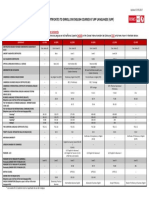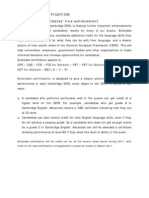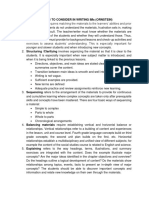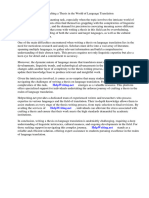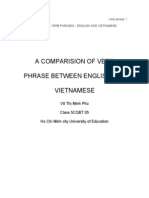02.INGLESE ACCESSO CORSI MOBILITA' Versione Inglese
02.INGLESE ACCESSO CORSI MOBILITA' Versione Inglese
Uploaded by
Alrachid AbdulCopyright:
Available Formats
02.INGLESE ACCESSO CORSI MOBILITA' Versione Inglese
02.INGLESE ACCESSO CORSI MOBILITA' Versione Inglese
Uploaded by
Alrachid AbdulOriginal Title
Copyright
Available Formats
Share this document
Did you find this document useful?
Is this content inappropriate?
Copyright:
Available Formats
02.INGLESE ACCESSO CORSI MOBILITA' Versione Inglese
02.INGLESE ACCESSO CORSI MOBILITA' Versione Inglese
Uploaded by
Alrachid AbdulCopyright:
Available Formats
ENGLISH
International certificates accepted by the University Language Centre (CLA)
as entry requirements for degree programmes and courses at the CLA, and international exchanges
International certificates accepted by the University Language Centre (CLA) as entry requirements for
degree programmes and courses at the CLA, and international exchanges
The following table of international certificates accepted as entry requirements for degree programmes and courses at the CLA, and international exchanges was approved
by the Teaching Committee of the University Language Centre on July 10 2018 and is valid from September 1 2018 .
This table is different from the the table for international certificates accepted as valid for the European Credit System, which can be found at the following link:
https://www.cla.unitn.it/en/780/certificates-do-you-have-a-certificate).
Some certificates were recognised in the last academic year i.e. up to August 31 2018 but are no longer accepted as valid. A list of the certificates accepted last year can be
found in the table at the following link: https://www.cla.unitn.it/en/780/certificates-do-you-have-a-certificate. As an exception, the certificates on this list which are no
longer recognised will be accepted for this academic year 2018/19 up to September 30 2019, as long as they were awarded no more than 3 years earlier and not after
August 31 2018.
For an international certificate to be considered valid for entry requirements and exchanges, it needs to have the following criteria:
1. The awarding body certifies all four skills and provides a grade for each skill.
2. Either the grade for each of the four skills is at the required level or the student had obtained the average overall grade required by the exam board.
3. The expiry date for a certificate is five years after the award date. However, if the certificate has a shorter expiry date than five years, this shorter expiry date will
apply.
4. The original certificate must be taken to the Academic and Student Support Services office in person (for entry requirements for degree programmes), to the
International Mobility office (for international exchanges), or to the University Language Centre (CLA) on enrolment (when progressing to a higher level and the
previous level is not registered on Esse3). An electronic copy of the certificate may be sent e.g. a .pdf file via apply, but this must correspond exactly to the original
certificate. For precise details on how and when certificates can be presented, please check with the Academic and Student Support Services office.
Not all university departments use this table to accept credits. Therefore it is essential – and the responsibility of the student – to check that their
Department, Faculty and/or degree programme recognises this table.
Extra information for students on the following courses:
- The School of International Studies sets extra restrictions on which language certificates it accepts. For information, please check with the person responsible for
languages.
- The certificates accepted by The Department of Economics and Management are available here: https://offertaformativa.unitn.it/it/l/economia-e-
management/lingue-straniere.
ENGLISH
International certificates accepted by the University Language Centre (CLA)
as entry requirements for degree programmes and courses at the CLA, and international exchanges
Common European Framework of Reference for Languages (CEFR)
This framework is an international standard set by the European Council. It provides a set of descriptors of linguistic competences which a language learner develops as
s/he progresses in one or more languages. There are six levels of language competence (A1/A2, B1/B2, C1/C2), split into three main levels: Elementary (A), Intermediate
(B), and Advanced (C).
Exam Board A1 A2 A2+ B1 B2 C1 C2
PET FCE CAE
KET CPE
(Preliminary (First Certificate in (Certificate in
(Key English Test) (Certificate of
English Test) English) Advanced English)
University of Cambridge Council of Proficiency in
Council of Europe Council of Europe Council of
ESOL Examinations Europe level A2 English)
level B1 level B2 Europe level C1
(1)
BEC Preliminary BEC Vantage BEC Higher
Bulats: 0 - 19 Bulats: 20 - 39 Bulats: 40 - 59 Bulats: 60 - 74 Bulats: 75 - 89 Bulats: 90 - 100
(1) The following certificates are also recognised:
- University of Cambridge – Council of Europe Level A2 (Cambridge Preliminary not passed, but A2 mark is achieved in each of the four skills)
- University of Cambridge – Council of Europe Level B1 (Cambridge First not passed, but B1 mark is achieved in each of the four skills)
- University of Cambridge – Council of Europe Level B2 (Cambridge Advanced not passed, but B2 mark is achieved in each of the four skills)
- University of Cambridge – Council of Europe Level C1 (Cambridge Proficiency not passed, but C1 mark is achieved in each of the four skills)
ESOL (IESOL) ESOL (IESOL)
ESOL (IESOL) ESOL (IESOL) ESOL (IESOL)
Preliminary ESOL (IESOL) Communicator
City & Guilds Access Expert Mastery
+ Achiever + +
(Pitman ESOL)(2) + + +
Spoken English Spoken English Spoken English
Spoken English Spoken English Spoken English
(ISESOL) (ISESOL) Achiever (ISESOL)
(ISESOL) Access (ISESOL) Expert (ISESOL) Mastery
Preliminary Communicator
(2) City &Guilds ESOL exams are only written, while the ISESOL exams are oral. It is therefore necessary to show both certificates in order for the exam to be recognised.
ISE I ISE II ISE III
Trinity College of London
ISE 0 (Integrated Skills in (Integrated Skills in (Integrated Skills in ISE IV
(3)
English) English) English)
(3) Only Trinity ISE exams (Integrated Skills in English) are recognised.
ENGLISH
International certificates accepted by the University Language Centre (CLA)
as entry requirements for degree programmes and courses at the CLA, and international exchanges
Exam Board A1 A2 A2+ B1 B2 C1 C2
Modest User Competent User Good User Very Good User
Overall band score Overall band score Overall band score Overall band score
IELTS (4) e (5) 4.5 5.5+ 7-8 8.5
(each skill must be (each skill must be (each skill must be (each skill must be
>= 4) >= 5.5) >= 6.5) >= 8.0)
(4) IELTS avallate all four langauge skills. As mentioned above, the certificate is only recognised when the Overall band score shown above is achieved. If the minimum mark in all four skills
is achieved, but the Overall band score is not, then the certificate will NOT be recognised. The relationship between IELTS and the Common European Framework, please see the
Cambridge English Scale below. Both versions of IELTS are valid: Academic or General Training.
(5) IELTS certificates are valid for 2 years from the award date
No skill lower than No skill lower than No skill lower than No skill lower than
TOEFL iBT 11 18 24 28
Internet-based (each skill must be (each skill must be >= (each skill must be >= (each skill must be >=
Testing (6) e (7) >= 11) 18) 24) 28)
See toefl website See toefl website See toefl website See toefl website
(6) TOEFL certificates are valid for 2 years from the award date
(7) Paper-based TOEFL must be presented with the TWE (Test of Written English) and TSE (Test of Spoken English); while computer-based TOEFL must be presented with the TSE (Test of
Spoken English).
English for
London Chamber of English for English for English for English for English for Business
Business
Commerce and Business Business Level 1 Business Level 2 Business Level 3 Level 4
Elementary
Industry Elementary Credit or Distinction Credit or Distinction Credit or Distinction Credit or Distinction
Credit or Distinction
Examinations Board Pass (not Pass) (not Pass) (not Pass) (not Pass)
(not Pass)
(LCCIEB)
OR
Conosciuto anche
come EDI* JETSET level 6
JETSET level 2 JETSET level 3 JETSET level 4 JETSET level 5 (Effective JETSET level 7
Jetset (Breakthrough) (Waystage) (Threshold) (Vantage) Operational (Mastery)
Proficiency)
Pearson General
Foundation Level 1 Level 2 Level 3 Level 4 Level 5
English Test
Pearson Academic
Minimum mark: 30 Minimum mark: 42 Minimum mark: 65 Minimum mark: 83
English Test
Oxford Test of
- 51-80 - Mark: 81 - 110 Mark: 111-140 - -
English “B” level
ENGLISH
International certificates accepted by the University Language Centre (CLA)
as entry requirements for degree programmes and courses at the CLA, and international exchanges
Exam Board A1 A2 A2+ B1 B2 C1 C2
NATO STANAG STANAG 1 STANAG 2 STANAG 3 (= B2+) STANAG 4 (= C1+) STANAG 5 (=C2+)
Elementary Intermediate AcCEPT Proficiency Masters
AIM Awards ANGLIA Preliminary Pre-Intermediate Advanced
Practical Business Intermediate Advanced Business Proficiency in
English Business English English Business English
You might also like
- TEF Canada Expression Écrite : 150 Topics To SucceedFrom EverandTEF Canada Expression Écrite : 150 Topics To SucceedRating: 4.5 out of 5 stars4.5/5 (17)
- TEF CANADA Express Guide: 45 min to double your scoreFrom EverandTEF CANADA Express Guide: 45 min to double your scoreRating: 1 out of 5 stars1/5 (1)
- Borang Transit F3 PenjajaranDocument4 pagesBorang Transit F3 PenjajaranadabirmNo ratings yet
- Certificates English B2Document2 pagesCertificates English B2かちえ ちょうNo ratings yet
- IESOL Written QualificationDocument96 pagesIESOL Written Qualificationprathamesh sasane100% (1)
- Pedagogy 2nd Edition. New York: LongmanDocument2 pagesPedagogy 2nd Edition. New York: LongmanKasia BielawskaNo ratings yet
- 02.INGLESE CFU Versione IngleseDocument5 pages02.INGLESE CFU Versione IngleseRomeo ADJOVINo ratings yet
- Certificados para La Acreditacio N de Niveles de Ingle S 23 24Document1 pageCertificados para La Acreditacio N de Niveles de Ingle S 23 24lucifermorning1701No ratings yet
- Annex 2 - English Language CertificatesDocument1 pageAnnex 2 - English Language CertificatesAimen MohamedNo ratings yet
- English: Accepted Certificates To Enroll On English Courses at Upf Languages (Iupf)Document1 pageEnglish: Accepted Certificates To Enroll On English Courses at Upf Languages (Iupf)Francisco GomesNo ratings yet
- MB_Sprachnachweis_Englisch_Language_Certificate_English.de.enDocument2 pagesMB_Sprachnachweis_Englisch_Language_Certificate_English.de.enUttamNo ratings yet
- Admissions Open at University of Politecnica delle Marche requirementDocument2 pagesAdmissions Open at University of Politecnica delle Marche requirementmuhammadramzan8829No ratings yet
- Cambridge University: Did You Know?Document14 pagesCambridge University: Did You Know?Aashish33% (3)
- Italy B2 certificate documentDocument2 pagesItaly B2 certificate documentAlfredNo ratings yet
- English Language RequirementsDocument25 pagesEnglish Language RequirementsLài LêNo ratings yet
- English Language RequirementsDocument25 pagesEnglish Language RequirementsHoàng Oanh Nguyễn MaiNo ratings yet
- Accepted Language Certificates 4Document2 pagesAccepted Language Certificates 4fahim8293No ratings yet
- Examene Echivalare Bac enDocument2 pagesExamene Echivalare Bac enmirabikaNo ratings yet
- Accepted English CertificatesDocument4 pagesAccepted English Certificatesmedkhadiri12No ratings yet
- The List of Eligible Certificates of English LanguageDocument2 pagesThe List of Eligible Certificates of English LanguageVictor CaceresNo ratings yet
- Checklist Non Eu Bachelor Entro GiugnoDocument3 pagesChecklist Non Eu Bachelor Entro GiugnoUzair LateefNo ratings yet
- English Requirements and How To Achieve Them 13122018Document6 pagesEnglish Requirements and How To Achieve Them 13122018FRANCISCONo ratings yet
- English Language Requirements: Accepted Certifications and ScoresDocument17 pagesEnglish Language Requirements: Accepted Certifications and ScoresJorge CastaNo ratings yet
- Recunoastere Diplome 1Document6 pagesRecunoastere Diplome 1cernat katiNo ratings yet
- Internationaly Recognized Language ExamDocument3 pagesInternationaly Recognized Language ExamFareed NaufalNo ratings yet
- TABLA Exámanes Internacionales Certificación OK UNISALLE 2024Document1 pageTABLA Exámanes Internacionales Certificación OK UNISALLE 2024Leo NovoxNo ratings yet
- At. 3 List of Recognized English Language Certificates Banach 2022Document2 pagesAt. 3 List of Recognized English Language Certificates Banach 2022kashraf042No ratings yet
- Annex 1 Accepted Language Skills 2022-2023Document10 pagesAnnex 1 Accepted Language Skills 2022-2023Denisa HatamianNo ratings yet
- Cef PDFDocument1 pageCef PDFedenic_countNo ratings yet
- English Certificates enDocument3 pagesEnglish Certificates enأقوال توماس شيلبي100% (1)
- Certyfikaty Potwierdzające Znajomość Języka Angielskiego 2024 - 2025Document2 pagesCertyfikaty Potwierdzające Znajomość Języka Angielskiego 2024 - 2025Максим ЧумаченкоNo ratings yet
- Reference Table English Language ProficiencyDocument1 pageReference Table English Language Proficiencynaizabekova.a94No ratings yet
- Diplomas and Certificates FrançaiseDocument6 pagesDiplomas and Certificates FrançaiseCristina DuroNo ratings yet
- What Is FCE?: 2. Exam StructureDocument52 pagesWhat Is FCE?: 2. Exam Structurethydng05No ratings yet
- S2 ReqDocument1 pageS2 ReqpixyheavNo ratings yet
- English-Language-requirements-2Document2 pagesEnglish-Language-requirements-2sarika.toefltestNo ratings yet
- English Language RequirementsDocument3 pagesEnglish Language Requirementsأقوال توماس شيلبيNo ratings yet
- Language CertificationsDocument16 pagesLanguage Certificationsworld.of.ledgersNo ratings yet
- Step To Preliminary A1Document32 pagesStep To Preliminary A1Мавлюда МукумоваNo ratings yet
- Worksheet 5 Initial ReflectionDocument5 pagesWorksheet 5 Initial ReflectionJose FrancoNo ratings yet
- Accepted - Language - Certificates 25 - 26Document6 pagesAccepted - Language - Certificates 25 - 26yohannestibebu12No ratings yet
- CertificazioniENG Dicembre2023 SignedDocument3 pagesCertificazioniENG Dicembre2023 Signedaurora.murgia2005No ratings yet
- Listado Plazas FacultadesDocument32 pagesListado Plazas FacultadesAlbaSanchezVelazquezNo ratings yet
- Accepted English Language ProofsDocument1 pageAccepted English Language ProofsThe SpotNo ratings yet
- Anexa Regulament Licenta 2013Document2 pagesAnexa Regulament Licenta 2013Carmen Cristina TrutaNo ratings yet
- Specific Language Requirements 2017-2018Document8 pagesSpecific Language Requirements 2017-2018Mariglen DemiriNo ratings yet
- Tablas Acredit Idiomas IMPORTANTEDocument9 pagesTablas Acredit Idiomas IMPORTANTEMEMORIAZABALANo ratings yet
- Master Admission ProcedureDocument13 pagesMaster Admission ProcedureLakshay vermaNo ratings yet
- 004 FCE Information enDocument1 page004 FCE Information enSteven RojasNo ratings yet
- Accepted - Language - Certificates 24 - 25Document6 pagesAccepted - Language - Certificates 24 - 25anees ur rehmanNo ratings yet
- The Knowledge of English May Be Certified by Following DocumentsDocument1 pageThe Knowledge of English May Be Certified by Following DocumentsАлтынгуль Ережепова100% (1)
- English Vi Preliminary English Test (PET) and First Certificate in English (FCE) TrainingDocument29 pagesEnglish Vi Preliminary English Test (PET) and First Certificate in English (FCE) TrainingAngieNo ratings yet
- JUNIORDocument21 pagesJUNIORLEILA CUELLONo ratings yet
- NS-How-to-apply-for-foreign-studentsDocument2 pagesNS-How-to-apply-for-foreign-studentss.gul45803No ratings yet
- The Russian Language Centre - TRKI LevelsDocument3 pagesThe Russian Language Centre - TRKI LevelsCristina_spqrNo ratings yet
- Cambridge English Extended CertificationDocument3 pagesCambridge English Extended CertificationaaciinternacionalNo ratings yet
- levelsChart_DEDocument1 pagelevelsChart_DEHendra SamanthaNo ratings yet
- Arden UniversityDocument1 pageArden Universityapplications.hnhNo ratings yet
- The Cambridge English Scale ExplainedDocument8 pagesThe Cambridge English Scale ExplainedcontatoNo ratings yet
- Acceptable English Language QualificationsDocument8 pagesAcceptable English Language Qualificationsrazawarraich941No ratings yet
- Step To Intermediate B1Document50 pagesStep To Intermediate B1Мавлюда Мукумова100% (1)
- International Certificate Written Test Guide A1Document29 pagesInternational Certificate Written Test Guide A1superksip ervanNo ratings yet
- Mieder, Wolfgang - International Proverb Scholarship. An Updated BibliographyDocument62 pagesMieder, Wolfgang - International Proverb Scholarship. An Updated Bibliography汪嘉楠No ratings yet
- CFGDocument4 pagesCFGmani khanNo ratings yet
- Week 3 - Factors To Consider in Writing IMs (Ornstein), Principles of Materials DesignDocument4 pagesWeek 3 - Factors To Consider in Writing IMs (Ornstein), Principles of Materials DesignAlfeo Original100% (1)
- Pedagogic Projects Harmonised Form FourDocument16 pagesPedagogic Projects Harmonised Form FourtangwalisbiNo ratings yet
- Unit 1 The Simple Present, Frequency WordDocument36 pagesUnit 1 The Simple Present, Frequency WordErik Nahún PortilloNo ratings yet
- Language Planning and Policy Dr. Azadeh AsgariDocument18 pagesLanguage Planning and Policy Dr. Azadeh AsgariDr. Azadeh Asgari100% (3)
- 3-Worksheet-Troublesome VerbsDocument2 pages3-Worksheet-Troublesome VerbsAbdulrahman HatemNo ratings yet
- Group1cis 151005121205 Lva1 App6892Document27 pagesGroup1cis 151005121205 Lva1 App6892Geraldine MinongNo ratings yet
- Thesis Language TranslatorDocument4 pagesThesis Language Translatoraparnaharrisonstamford100% (2)
- English Practice IntermediateDocument18 pagesEnglish Practice IntermediateIdrissa Seydou IssakaNo ratings yet
- How Much Can You Remember?: Pre-ActivityDocument2 pagesHow Much Can You Remember?: Pre-ActivityMichelJorgeNo ratings yet
- ĐÁP ÁN ĐỀ ÔN TẬPDocument5 pagesĐÁP ÁN ĐỀ ÔN TẬPAn0unknown01explorerNo ratings yet
- Grammar Rules - Speak Good English Movement 1Document108 pagesGrammar Rules - Speak Good English Movement 1rrrrwrwrwijeiepieNo ratings yet
- Vo Thi Minh Phu-Verb PhraseDocument19 pagesVo Thi Minh Phu-Verb PhraseHồng NgọcNo ratings yet
- Engl 10-Q1-M7Document34 pagesEngl 10-Q1-M7erlinda garciaNo ratings yet
- English First Periodical Test BASA Pilipinas S.Y. 2017-2018: Choose The Letter of The Correct AnswerDocument3 pagesEnglish First Periodical Test BASA Pilipinas S.Y. 2017-2018: Choose The Letter of The Correct AnswerDenzky EspinosaNo ratings yet
- Student EssaysDocument41 pagesStudent EssaysAsif RahmanNo ratings yet
- Cvv¨Μg I Cixÿv C×Wz-2021Bs: Probable Date Of Examination-2022Document27 pagesCvv¨Μg I Cixÿv C×Wz-2021Bs: Probable Date Of Examination-2022Parvej IslamNo ratings yet
- Six Principles of Language Development Implications For Second Language LearnersDocument18 pagesSix Principles of Language Development Implications For Second Language Learnersfaisal alghifariNo ratings yet
- 2022 Acl-Long 524Document18 pages2022 Acl-Long 524katono7302No ratings yet
- Worksheet #2 Be Going ToDocument3 pagesWorksheet #2 Be Going TogomezjossandyNo ratings yet
- Identifying Alliteration: Alliteration Is The Repetition of First Consonant SoundsDocument2 pagesIdentifying Alliteration: Alliteration Is The Repetition of First Consonant Soundsviji senthilkumar100% (1)
- Justice Katju ArticleDocument12 pagesJustice Katju Articlebookish87No ratings yet
- Gram Exp U51 Infinitives of Purpose 3Document5 pagesGram Exp U51 Infinitives of Purpose 3api-515535366No ratings yet
- Marianna Ucrìa". The Book Became Very Popular in Italy and Was Translated in Many LanguagesDocument1 pageMarianna Ucrìa". The Book Became Very Popular in Italy and Was Translated in Many LanguagesOvidiu ZaietNo ratings yet
- FP Gad m09 U2 PdfindexDocument61 pagesFP Gad m09 U2 PdfindexberriomgNo ratings yet
- Se Se Jeleng Rre Notes and ExplanationDocument102 pagesSe Se Jeleng Rre Notes and ExplanationzukiswalempeNo ratings yet
- Language Assessment: Tsl3112 HhyeohDocument22 pagesLanguage Assessment: Tsl3112 HhyeohHariz SaveGazaNo ratings yet









